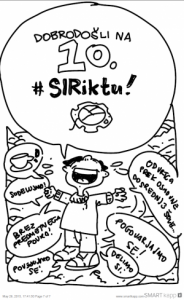Maja Omahen in Dunja Blaznik, Osnovna šola Vide Pregarc, Ljubljana
This paper belongs to the open learning section of the conference because it deals with autonomous learning. The students need the teacher as well as mathematical ICT tools in order to acquire knowledge. These tools enable them to learn autonomously outside class. The teachers are not at the forefront of teaching since they only create the learning environment where each student gets an individual role for a specific and challenging task. This paper focuses on one of the possible ways of how to teach students measuring and data processing with the help of ICT. We will focus on the advantages and disadvantages of using ICT tools. We wanted to show the students how to become autonomous learners, we wanted to evaluate what they have already learnt and show how to effectively use ICT tools. In this way the teacher assumes the role of a mentor who directs the students’ learning. The role of the teacher changes from the source of information to a mentor and a tutor who is flexible about the learning process and adapts it according to the students’ abilities, needs and interests. As a part of a science day, the students learnt about collecting, processing and presenting data with the help of E-um web page. They transferred the knowledge gathered there to a specific situation. They used their own notes to collect, process and present data in MS Excel and different charts. At the end of the day we checked the students’ knowledge by means of interactive exercises. The students’ themselves evaluated autonomous learning process with the help of a web questionnaire. Autonomous learning helps the students to individually manage their own learning process. E- learning material along with the pictorial support it provides is very motivating for students, since they can use different learning styles and a research approach to learning. Using ICT tools also directs students’ attention. By focusing more and longer it is easier for the student to work with several devices at a time. Working with e-tools proved to be motivating for students with learning difficulties since it enables them to work on different kinds of subject matter, such as forming notes, mind maps and presentations.
